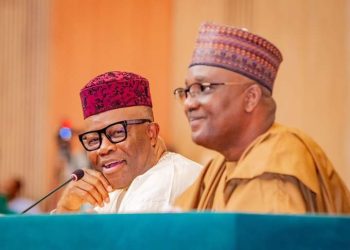The National Assembly has congratulated President Bola Ahmed Tinubu for his decision to bring back the old National Anthem, a move that has resonated with both lawmakers and citizens alike. The President signed the Bill into law on a Wednesday morning, just before making a brief visit to the National Assembly. There, he addressed a joint session of lawmakers and also inaugurated the National Assembly Library. This was part of a series of engagements marking his first year in office, showcasing the government’s efforts in strengthening institutions and promoting national unity.
During his visit to the National Assembly, President Tinubu also announced that a supplementary Appropriation Bill for the 2024 budget would soon be presented to the lawmakers for consideration. The Bill is expected to address additional funding needs for various national programs and projects.
Before the President arrived, Senate President Godswill Akpabio addressed the assembly, informing the members that the occasion was meant to celebrate the return of the old National Anthem, and although it wasn’t officially Democracy Day, the presence of the President was significant. He explained that the President had chosen to pass through the National Assembly as part of the commemoration of the restoration of the National Anthem, a powerful symbol of Nigeria’s unity. After hearing the anthem sung by the lawmakers, President Tinubu would continue with his day’s activities, which included commissioning various national projects.
The Senate President also took the opportunity to express gratitude to his fellow lawmakers for ensuring the passage of the bill that led to the return of the old National Anthem. He praised the Speaker, Deputy Speaker, the leadership of the House of Representatives, as well as the Deputy Senate President and Senators for their roles in making the anthem a reality. Akpabio highlighted the importance of the anthem, which symbolizes a return to the core values of Nigeria’s democracy.
Akpabio also shared how, as part of the celebration, members of both the Senate and the House of Representatives had planned this special event. He referred to the event as a “waka pass,” a term often used in Nollywood to describe a short, yet impactful appearance. He noted that the President’s participation in the celebration was a sign of respect for the National Assembly and its members. “Today, we are marking the return to the essence of our democracy,” Akpabio said, explaining the significance of the moment.
When President Tinubu arrived, he was warmly welcomed by the lawmakers. Akpabio used the occasion to congratulate him on his first year in office, calling it a milestone for the President and for Nigeria. He acknowledged Tinubu’s achievements, particularly in restoring the old anthem, which he saw as a profound step in reconnecting Nigerians to their shared history, despite the country’s many ethnic groups and languages. The Senate President highlighted that the anthem not only celebrates the country’s diversity but also fosters a sense of unity among the people. “We are not just compatriots anymore; we are brothers and sisters,” he said, emphasizing the deep connection between Nigerians.
Akpabio further explained that the National Assembly, composed of elected representatives of the people, is the true voice of the nation. He emphasized the patriotic role of the lawmakers, stating that the Senate and House of Representatives serve as the pillars that uphold the country’s democracy. He also noted that the return to the old anthem was an important step in reaffirming the values and spirit of Nigeria, and it was only fitting that the National Assembly should lead this celebration.
In his response, President Tinubu expressed his heartfelt gratitude to the National Assembly for their role in strengthening the country’s institutions. He acknowledged that the lawmakers were at the forefront of Nigeria’s democratic journey and praised their commitment to the nation’s growth. “The National Assembly represents our collective desire for freedom, unity, and progress,” he said. He further noted that the decision to restore the old National Anthem was a reflection of Nigeria’s diversity, with all ethnic groups coming together as one nation.
Tinubu took a moment to reflect on his own political journey, recalling how he had started his path to the presidency from the National Assembly. He described the institution as central to his rise to political prominence and offered his respect to the lawmakers for their efforts in building the nation. He also urged them to continue collaborating for the country’s development, stressing that no external forces or foreign aid could build Nigeria better than Nigerians themselves. “We must work together to build our country, not just for ourselves, but for future generations,” Tinubu declared.
He also addressed the importance of passing the national budget, thanking the lawmakers for their swift approval of the previous year’s budget. He reassured them that the government was working diligently to implement its plans and would soon submit the 2024 supplementary budget for approval. He emphasized that ensuring the success of democracy was vital for the prosperity of future generations, particularly in guaranteeing their access to opportunities and growth.
After the President’s speech, the Speaker of the House of Representatives, Hon. Tajudeen Abbas, delivered a vote of thanks. He also expressed appreciation to President Tinubu for bringing back the old National Anthem, calling it a significant achievement for the nation. Abbas emphasized that the relationship between the executive and the legislative arms of government had been a “win-win” for the country, underlining the importance of working together to achieve common goals.
Abbas also took a moment to reflect on the meaning of the National Anthem. He urged everyone to pay close attention to the words of the anthem, as they encapsulate the spirit of unity and brotherhood that Nigeria represents. He explained that the anthem’s lyrics symbolize the need for collective effort and shared responsibility in building a stronger, more prosperous nation.
The return of the old National Anthem is seen by many as a powerful statement of national unity. It marks a return to the country’s roots, where Nigerians, despite their different ethnic backgrounds and languages, stand together as one. The anthem reminds citizens of their shared history, their commitment to each other, and their duty to build a better future for the generations to come.
As Nigeria celebrates this significant moment, the emphasis is on unity, patriotism, and progress. The National Assembly’s role in restoring the anthem highlights the importance of the legislative arm of government in shaping the nation’s identity and values. The collaboration between the President and the lawmakers is seen as a positive step toward strengthening Nigeria’s democracy and ensuring that the country remains on the path of growth and development.
President Tinubu’s first year in office has been marked by a series of initiatives aimed at improving governance, strengthening institutions, and uniting the nation. The restoration of the old National Anthem is one such initiative that has been widely welcomed, and it reflects the President’s commitment to fostering a sense of national pride and unity. With the continued support of the National Assembly, Nigeria is poised to continue on its journey toward a brighter and more prosperous future.

